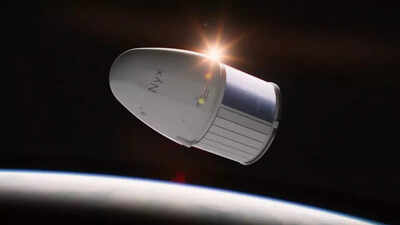On June 23, SpaceX is scheduled to launch a unique mission: the Perseverance Flight, carrying over 150 capsules of cremated remains and DNA samples into low Earth orbit. This venture combines space exploration with a deeply personal form of remembrance.

Concept image of the upcoming memorial spaceflight.
The mission is a collaborative effort between Celestis, a space burial company based in Houston, and The Exploration Company (TEC), a European spacecraft firm. The symbolic journey, part of the Transporter 14 rideshare mission, offers families worldwide a distinctive way to memorialize loved ones or send a piece of themselves into the cosmos, either as a final tribute or as a testament to their fascination with space. Following its orbital journey, the spacecraft will re-enter Earth's atmosphere, culminating in a splashdown in the Pacific Ocean.
Since 1994, Celestis has been at the forefront of space burial services, providing individuals with the opportunity to honor their loved ones through a final voyage beyond our planet. The Perseverance Flight marks Celestis’s 25th mission and its 12th "Earth Rise" flight. Unlike missions that send remains into deep space or to the moon, this Earth orbit mission ensures the capsules' recovery, allowing families to receive a tangible memento that has journeyed through space.
Celestis's past missions have carried the remains and DNA of a diverse range of individuals, including celebrities, pets, and historical figures. Previous flights have included symbolic remains of former U.S. Presidents like George Washington and John F. Kennedy, alongside Star Trek icons such as Gene Roddenberry and Nichelle Nichols. Notably, 3-year-old Matteo Barth is among the participants, poised to become the youngest European to send DNA into space, symbolically joining his late grandfather, who was a space aficionado.
The memorial capsules will be housed within TEC’s Mission Possible spacecraft, which will be launched aboard a SpaceX Falcon 9 rocket from Vandenberg Space Force Base in California. Upon reaching orbit, the capsule will circle the Earth two or three times before re-entering the atmosphere. The payload will then descend into the Pacific Ocean, where recovery teams will retrieve it and return the capsules to the families as cherished, space-flown keepsakes.
Sending ashes or DNA into space provides a meaningful and personalized way to honor those who cherished science, exploration, or the mysteries of the universe. For others, it represents a symbolic integration into humanity's spacefaring future. This act transforms remembrance into an extraordinary voyage, often fulfilling lifelong dreams of reaching for the stars, albeit in a symbolic form.
This mission serves as TEC's second demonstration before the launch of its Nyx Earth orbital vehicle, slated to dock with the ISS by 2028. For Celestis, the collaboration opens new avenues for accessible space memorials. As commercial spaceflight becomes increasingly common, missions like the Perseverance Flight underscore the growing integration of space into human narratives and legacies.
Newer articles
Older articles
 Rishabh Pant's Game-Changing Innings Draw Adam Gilchrist Comparisons, Says Greg Chappell
Rishabh Pant's Game-Changing Innings Draw Adam Gilchrist Comparisons, Says Greg Chappell
 Greg Chappell: Rishabh Pant's Explosive Batting Redefining Cricket
Greg Chappell: Rishabh Pant's Explosive Batting Redefining Cricket
 Birmingham Nets Offer Clues: Bumrah's Intent and Kuldeep's Drive Ahead of Second Test
Birmingham Nets Offer Clues: Bumrah's Intent and Kuldeep's Drive Ahead of Second Test
 Gavaskar Calls for Kuldeep Yadav's Inclusion in Second Test Following India's Defeat Against England
Gavaskar Calls for Kuldeep Yadav's Inclusion in Second Test Following India's Defeat Against England
 Bollywood's "Swades" Anthem Joins Axiom-4 Mission, Fueling Indian Astronaut's Space Journey
Bollywood's "Swades" Anthem Joins Axiom-4 Mission, Fueling Indian Astronaut's Space Journey
 Stokes Lauds England's Openers for Setting Up Thrilling Chase Against India
Stokes Lauds England's Openers for Setting Up Thrilling Chase Against India
 Rogue Star Threat: Earth's Solar System Stability at Risk, New Study Warns
Rogue Star Threat: Earth's Solar System Stability at Risk, New Study Warns
 Bangladesh's Shadman Islam Defends Batting Lineup After Day 1 Setbacks Against Sri Lanka
Bangladesh's Shadman Islam Defends Batting Lineup After Day 1 Setbacks Against Sri Lanka
 Mirabai Chanu Reveals Relentless Focus on Training, Weight, and Sacrifices Required for Elite Weightlifting
Mirabai Chanu Reveals Relentless Focus on Training, Weight, and Sacrifices Required for Elite Weightlifting
 India Aims to Rewrite History in Birmingham Test After Headingley Setback
India Aims to Rewrite History in Birmingham Test After Headingley Setback